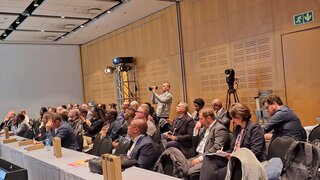𝐒𝐨𝐮𝐭𝐡 𝐀𝐟𝐫𝐢𝐜𝐚’𝐬 𝐭𝐫𝐚𝐧𝐬𝐦𝐢𝐬𝐬𝐢𝐨𝐧 𝐚𝐦𝐛𝐢𝐭𝐢𝐨𝐧𝐬 𝐚𝐫𝐞 𝐭𝐚𝐤𝐢𝐧𝐠 𝐬𝐡𝐚𝐩𝐞 – 𝐚𝐧𝐝 𝐭𝐡𝐞 𝐩𝐫𝐢𝐯𝐚𝐭𝐞 𝐬𝐞𝐜𝐭𝐨𝐫 𝐢𝐬 𝐤𝐞𝐲
At the 2025 edition of Enlit Africa, energy leaders from South Africa and Germany came together to explore the role of independent transmission projects (ITPs) in driving the country’s grid expansion. This exclusive side-event was co-hosted by the South African-German Energy Partnership and the Southern African-German Chamber of Commerce and Industry on 20 May 2025. The German Consul General Tanja Werheit provided opening remarks to the over 40 industry representatives and highlighted the growing ties between the two governments and the trade cooperation between the respective private sectors.
South Africa aims to add 14,000 km of new transmission lines and 133,000 MVA of transformer capacity over the next decade. An estimated R440 billion in capital investment is needed — and momentum is building to unlock funding, projects, and partnerships.
With bold targets and accelerating momentum, South Africa is laying the groundwork for private sector participation in a new era of transmission infrastructure. In delivering her keynote address, Ms Shaakira Karolia, Ministerial Advisor at the Ministry of Energy and Electricity, emphasized that “the Department of Energy and Electricity, in its role as the procurer, is to conduct one or more tendering procedures, including Request for Proposals, drafting the Transmission Services Agreements and other applicable project agreements and facilitating the programme conclusion, in addition to requisite key responsibilities” said Ms Karolia.
The ITP model is gaining traction. While market interest is strong and capital is available, success will depend on ensuring bankability, attractive project structures, and reduced implementation timelines. In providing progress and developments on the implementation of the Transmission Development Plan, Mr Jacob Machinjike, General Manager for Grid Planning and Development at the National Transmission Company of South Africa (NTCSA) concluded by highlighting that “the country faces five delivery risks to the overall programme. Land expropriations, servitude encroachment and access, line construction capacity as well as limited supply of transformers and availability of steel” said Mr Machinjike.
A discussion with representatives from government, business and academia, including Lena Mangondo (Independent Power Producer Office), Clinton Carter-Brown, Enertrag South Africa, Thabo Molekoa (Siemens Energy Southern Africa), Keith Webb, Rand Merchant Bank and Mark Swilling (Stellenbosch University) then delved deeper into recent developments, opportunities and challenges that need to be considered to create a meaningful collaboration that serves the national interests and those of the private sector.
Much has been achieved in the past six months to shape the regulatory and procurement framework. The next six months are critical, with the Request for Qualifications and Request for Proposals for Phase 1 of the transmission programme expected respectively, alongside preparations for additional bid windows.


